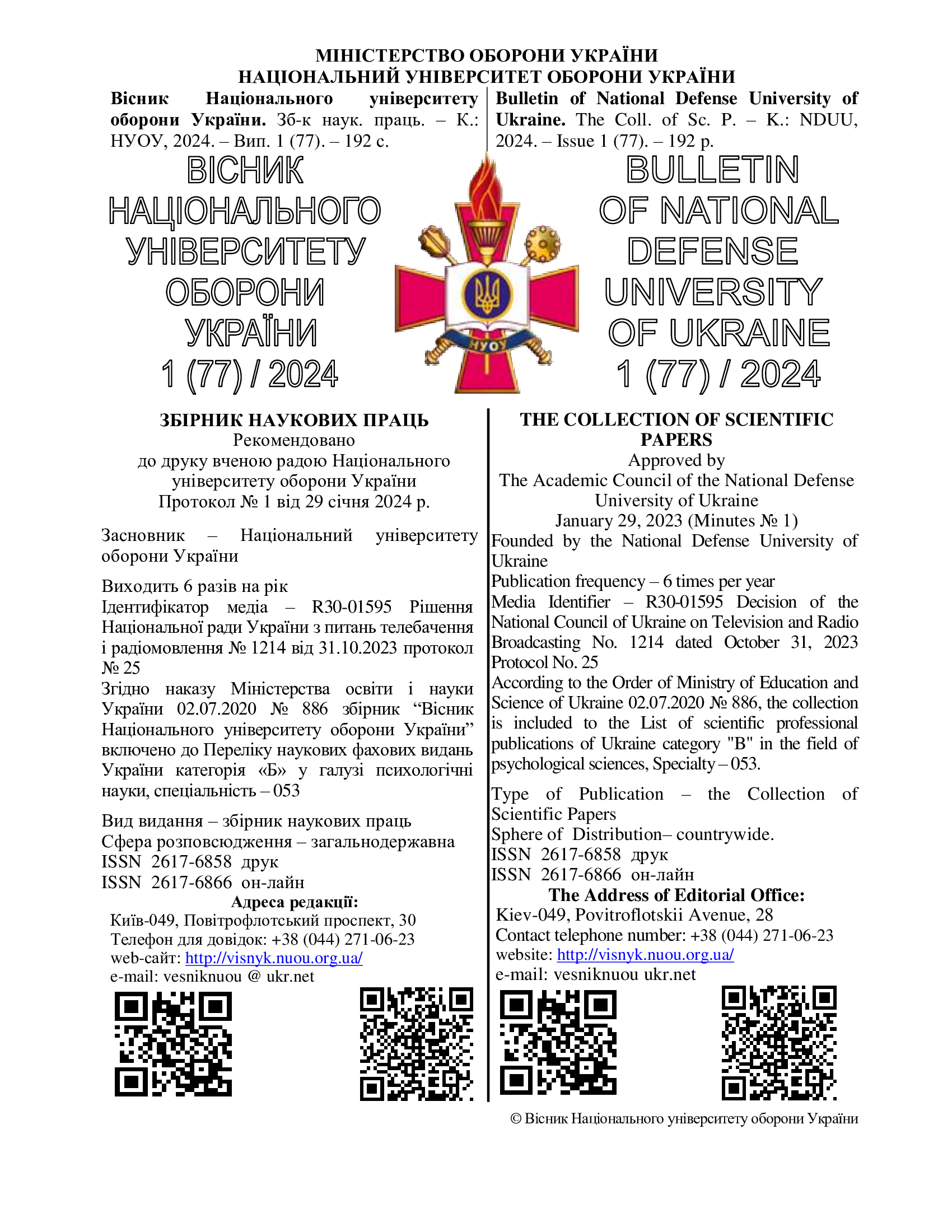ОРГАНІЗАЦІЙНА КУЛЬТУРА ЯК ЧИННИК ПРОФЕСІЙНОГО БЛАГОПОЛУЧЧЯ ОСОБИСТОСТІ
DOI:
https://doi.org/10.33099/2617-6858-2024-77-1-38-44Ключові слова:
благополуччя, професійне благополуччя особистості, благополуччя у професійному контексті, організаційна культура.Анотація
У статті проведено теоретичний аналіз зв’язку організаційної культури з різними аспектами професійного благополуччя особистості. Визначено, що високі оцінки благополуччя працівників на робочому місці пов’язані з обнадійливим і позитивним середовищем, яке підкреслює соціальні зв’язки між співробітниками, сприяє саморозвитку працівників і розширює їх права і можливості, схвалює креативну поведінку, надає можливість дотримуватись своїх власних цінностей і переконань, а також відчувати свободу поведінки та відстоювати те, у важливість чого вони вірять, і характеризується низькою стресогенністю, тобто задовольняє потреби працівників у безпеці, приналежності, компетентності, автономії, повазі та досягненнях.
Завантаження
Посилання
Petrunko O.V. (2022). Orhanizatsiina kultura universytetu yak chynnyk yoho konkurentozdatnosti na rynku osvitnikh posluh. [Organizational culture of the university as a factor of its competitiveness in the market of educational services]. Vcheni zapysky Universytetu «KROK». 1(65), 164-175. (in Ukrainian)
Kane-Urrabanzo, C (2006). Management's role in shaping organizational culture. Journal of Nursing Management, 14, 188-194
Shao, Z., Feng, Y. and Liu, L. (2012). The mediating effect of organizational culture and knowledge sharing on transformational leadership and Enterprise Resource Planning systems success: An empirical study in China. Computers in Human Behavior, 28, 2400-2413.
Cameron, K. S., & Quinn, R. E. (2011). Diagnosing and Changing Organizational Culture: Based on the Competing Values Framework (3rd ed.). San Francisco: Jossey-Bass.
Jae San Park, Tae Hyun Kim, (2009). Do types of organizational culture matter in nurse job satisfaction and turnover intention? Leadership in Health Services, 22(1), 20-38
Olynick, J. & Li, H. (2020). Organizational Culture and Its Relationship with Employee Stress, Enjoyment of Work and Productivity. International Journal of Psychological Studies. 12(2). 14-30
Sherman, S. G., Leahy, M. J., Del Valle, R., Anderson, C. A., Tansey, T. N., & Lui, K. (2014). Organizational and cultural factors that promote creative best practices in the public rehabilitation program: Findings from a four-state multiple case study. Journal of Vocational Rehabilitation, 41(2), 115-125
Pow, J., King, D. B., Stephenson, E., & DeLongis, A. (2017). Does social support buffer the effects of work-related stress on sleep quality among paramedics? A daily diary studies. Journal of Occupational Health Psychology, 22(1), 71–85
Chiaburu, D., Lorinkova, N., & Van Dyne, L. (2013). Employees’ social context and change-oriented citizenship: A meta-analysis of leader, coworker, and organizational influences. Group and Organization Management, 38. 291-333
Schultz M. L. Occupational Well-Being: the development of a theory and a measure: an abstract of a dissertation. Manhattan, Kansas: Kansas State University, 2008
Marinova, S. V., Cao, X., & Park, H. (2019). Constructive Organizational Values Climate and Organizational Citizenship Behaviors: A Configurational View. Journal of Management, 45(5), 2045–2071.
Ashforth, B. and Humphrey, R. (1995). Emotion in the workplace: a reappraisal. Human Relations, 48 (2), 97-125
Voitenko E., Kaposloz H., Myronets S., Zazymko O., Osodlo V. (2021). Influence of characteristics of self-actualization and coping behavior on resistance of teachers to professional stressors and emotional burnout. International journal of organizational leadership. 10 (1), 1-14.
Karamushka L.M. (2013). Struktura orhanizatsiinoi kultury: osnovni napriamky doslidzhennia [Structure of organizational culture: main directions of research]. Aktualni problemy psykholohii: zb. naukovykh prats Instytutu psykholohii im. H.S. Kostiuka NAPN Ukrainy. K. Alchevsk: LADO, I (37), 3-6. (in Ukranian)
Oishi, S., Diener, E., Suh, E., & Lucas, R. E. (1999). Value as a moderator in subjective well-being. Journal of Personality, 67(1), 157–184.
Ryan, R. M., & Deci, E. L. (2017). Self-Determination theory: basic psychological needs in motivation, development, and wellness. Guilford Press.
Humphrey, R. & Ashforth, B. & Diefendorff, J. (2015). The bright side of emotional labor: The Bright Side of Emotional Labor. Journal of Organizational Behavior. 36 (6). 749-769
Reis, G. & Trullen, J. & Story, J. (2016). Perceived organizational culture and engagement: the mediating role of authenticity. Journal of Managerial Psychology. 31(6). 1091-1105.
Gergen, K. J. (2000). The saturated self. New York: Basic Books.
Korporatyvni normy (2017) [Corporate norms]. Velyka ukrainska yurydychna entsyklopediia: u 20 t. 3, 255. (in Ukrainian)
Schein, E. H. (2004). Organizational culture and leadership (3nd ed.). San Francisco: Jossey-Bass.
Sparks, K., Faragher, B., Cooper, C. L. (2001). Well-being and occupational health in the 21st century workplace. Journal of Occupational and Organizational Psychology, 74, 489-509.
Karamushka L.M. (2007). Formuvannia konkurentozdatnoi upravlinskoi komandy (na materiali diialnosti osvitnikh orhanizatsii): monohrafiia. [Formation of a competitive management team (based on the activities of educational organizations): monograph]. Kyiv: INKOS. (in Ukrainian)
##submission.downloads##
Опубліковано
Як цитувати
Номер
Розділ
Ліцензія
Авторське право (c) 2024 Вісник Національного університету оборони України

Ця робота ліцензується відповідно до Creative Commons Attribution-NonCommercial-ShareAlike 4.0 International License.





